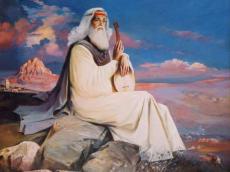|
|
TODAY.AZ / Arts & Entertainment
“The Book of Dede Gorgud”: Pearl of Turkish culture to be screened
25 September 2015 [10:56] - TODAY.AZ

By Amina Nazarli
“The Book of Dede Gorgud,” is a lasting pillar of the cultural history of the peoples of the Eurasian continent.
This heroic epic poem, dated to the 16th century, is an invaluable source uniting the Turkic world.
The book is distinguished for its antiquity and the information it carries about the culture of the Oghuz -- a Turkic tribal group who were the ancestors of the Azerbaijanis, Turks, Turkmens, and the Gagauz.
Currently, Kazakh cinematographers are working to bring the epic to the screen, joining forces with filmmakers of all Turkic-speaking countries.
A creative group, composed of Kazakh, Azerbaijani, Turkish, Uzbek, Kyrgyz, and Turkmen filmmakers, is expected to work on the big-budget production. The organizers also plan to involve Azerbaijani film director Ayaz Salayev in the shooting of film.
Filmmaker, producer, and culturologist Jaik Sizdikov of Kazakhstan said that the film would represent a new interpretation of the great history of the Turks, currently numbering about 200 million in the world.
As the image of Dede Gorgud is considered sacred to all Turks, the filmmakers have decided to promote this project internationally.
Sizdikov believes that cinema is now the most democratic medium that can "reach out" to audiences of many different ages, particularly to young people, who in any case should not forget their roots.
“We want to tell the world about the Turks through the film,” he noted, “The people who do not know or have forgotten their past have no future. So, we do not want to forget our past. We can say that patriotic feeling has prompted us to create such a project.”
This is not the first Dede Gorgud film that is being produced. In 1975, a film about “Kitabi-Dada Qorqud” (The Book of Dede Gorgud) was shot in Azerbaijan by national filmmaker Tofig Tagizada.
Being the first two-part TV series in the country, the film is considered the pearl of the Azerbaijani cinema.
“Before starting work on the project, we specifically watched that film. For its time, the film was undoubtedly breakthrough. But nowadays, with the current globalization and Turks rethinking their history, it requires a new approach. Today we can talk about our history without fear,” he said.
Sizdikov believes that the film can serve to bind the cultural gaps between Turkic cultures that have systematically been created over time.
“I think we have no fundamental differences. Just during a certain period we were skillfully divided. Take the Latin alphabet for example. Turkish people use Latin alphabet, however, Soviet power changed it to Cyrillic. We understood each other better through the Latin alphabet rather than the Cyrillic one. Thus, Turkic languages began to drift apart. But today no one bothers us to be closer in cultural terms,” the filmmaker said.
The first manuscript of The Book of Dede Gorgud, consisting of 12 stories (songs), was found in a Dresden library by German orientalist Heinrich Friedrich von Diez, who published a translation of the “Tapagoz” (cyclops), which is a part of the epos in 1815.
The Book of Dede Gorgud is a masterpiece in the world’s treasury of epic poems in terms of its artistic content, its poetic and linguistic features, and for its humanity and humanitarian ideas.
In 2000 Azerbaijan and UNESCO celebrated, the 1,300th anniversary of the epic Azerbaijani legend “Kitabi Dede Qorqud".
At that time, the General Director of UNESCO remarked, "Epics – and I have in mind in particular that of the Turkish-speaking peoples attributed to Dede Gorkud, perpetuated by oral tradition up to the 15th century before being written down – ...are vectors of the historical, geographical, political, social, linguistic and literary references of the peoples whose history they relate. Although many of these epics have already been noted down, the oral and gestural skills of the storytellers and griots who keep them alive should also be immortalized without delay. The matter is urgent."
Since 1956, UNESCO has commemorated historic events and the anniversaries of eminent personalities celebrated by Member States and Associate Members, in order to give them worldwide significance. Azerbaijan announced the Kitabi Dede Gorqud as its first "Celebration of anniversaries" in 1998. In 1999 the National Bank of Azerbaijan minted gold and silver commemorative coins for the 1,300th anniversary of the epic.
URL: http://www.today.az/news/entertainment/143948.html
 Print version
Print version
Connect with us. Get latest news and updates.
See Also
- 05 February 2026 [18:11]
Azerbaijan pays tribute to musical outstanding composer - 05 February 2026 [15:22]
Rashid Behbudov State Song Theatre holds retro night for music lovers - 05 February 2026 [13:23]
TURKPA Secretary General meets head of Turkic Culture and Heritage Foundation - 05 February 2026 [12:32]
Baku Dance Championship to gather young talents - 05 February 2026 [10:42]
Heydar Aliyev Center hosts exhibition 'Superheroes of Wildlife' - 04 February 2026 [14:18]
Baku hosts event dedicated to Azerbaijani and Egyptian poetry - 04 February 2026 [13:39]
Baku Chamber Orchestra mesmerizes listeners - 04 February 2026 [12:04]
Azerbaijan's Culture Minister holds talks with U.S. and Italian diplomats - 04 February 2026 [01:01]
Leyla Aliyeva visits Sheikh Zayed Mosque in Abu Dhabi - 04 February 2026 [00:46]
Leyla Aliyeva attends "Human Fraternity Majlis" event in Abu Dhabi
Most Popular
 Zangezur corridor become part of TEN-T: European Union is joining fight for South Caucasus
Zangezur corridor become part of TEN-T: European Union is joining fight for South Caucasus
 US moving forces into Middle East - What comes next with Iran?
US moving forces into Middle East - What comes next with Iran?
 Norwegian parliament to debate abolishing monarchy over 'Epstein' crisis
Norwegian parliament to debate abolishing monarchy over 'Epstein' crisis
 bp commemorates Magsud Ibrahimbayov’s birth anniversary
bp commemorates Magsud Ibrahimbayov’s birth anniversary
 Rumors about the Catholicos’ arrest are circulating in Armenia once again, raising the question of their purpose
Rumors about the Catholicos’ arrest are circulating in Armenia once again, raising the question of their purpose
 Azerbaijan, Armenia and Masdar
Azerbaijan, Armenia and Masdar
 Iran charges state TV staff after mockery of protest victims sparks outrage
Iran charges state TV staff after mockery of protest victims sparks outrage
